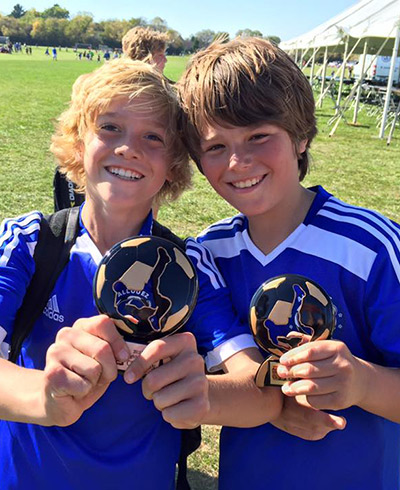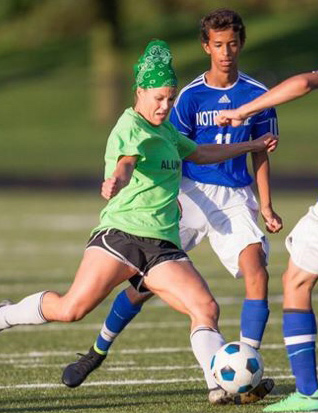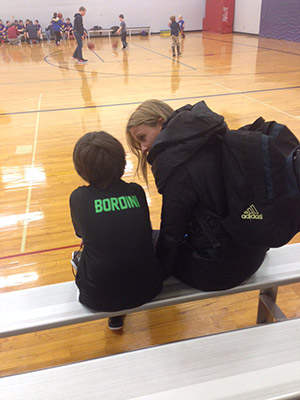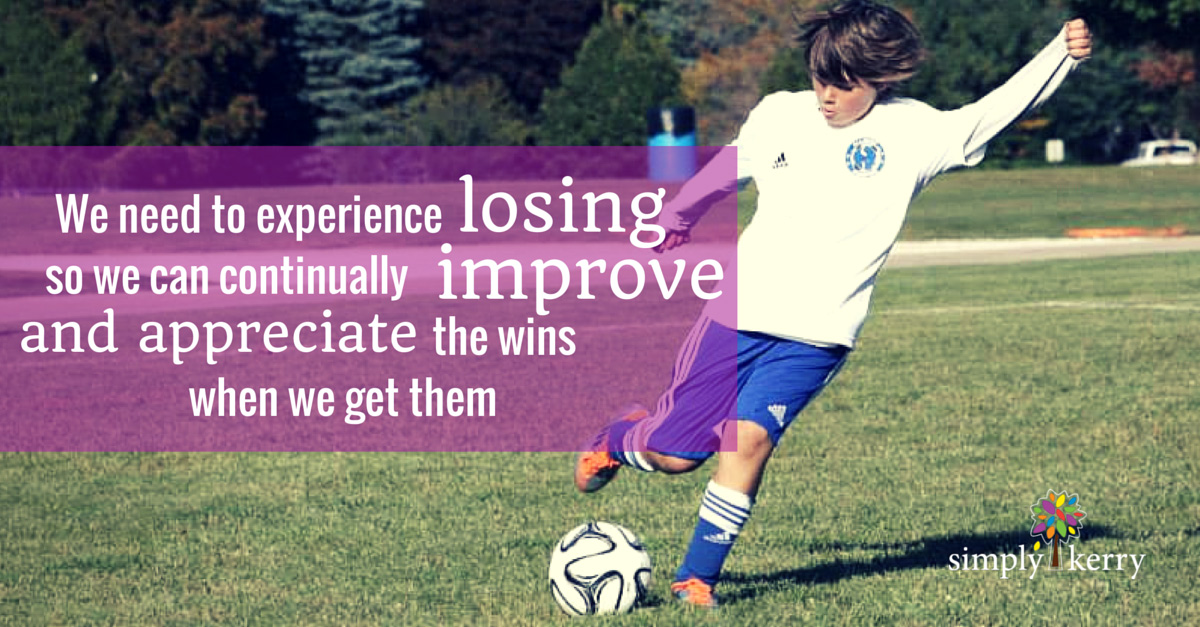This weekend was monumental for my son and I…
His team won the championship at the soccer tournament. Winning was awesome but that is not what made it extraordinary. This weekend was full of life lessons and experiences that will impact my son for the rest of his life.
Not long ago, this blog probably would have had a different tone. The focus would have been about winning, competing, and being the best. That’s because I “was” a soccer player. I actually still play soccer but now I am Kerry; a loving, adventurous, creative, and outgoing woman that loves to also play soccer.
There are some things that we do in our society that can be very detrimental to our children. These things were for me and actually contributed to my depression. My son is 10 years old and they are already happening, but I am proud to say that I am stopping the cycle before it takes over. Let me explain.
 While unpacking the car when we got home from the tournament, I found my son’s trophy on the floor of the back seat. I thought, “That’s strange, why is he not showing his dad or proudly showcasing it in his room?” I walked in the house and found my son out of sorts. He was pouty and snapping at the whole family. After I called him out on his behavior, his eyes welled up with tears. I asked what was wrong and he said, “I didn’t score. I don’t deserve the trophy. I suck.”
While unpacking the car when we got home from the tournament, I found my son’s trophy on the floor of the back seat. I thought, “That’s strange, why is he not showing his dad or proudly showcasing it in his room?” I walked in the house and found my son out of sorts. He was pouty and snapping at the whole family. After I called him out on his behavior, his eyes welled up with tears. I asked what was wrong and he said, “I didn’t score. I don’t deserve the trophy. I suck.”
Now let me tell you, my son far from sucked this weekend. He even made a play that won us the tournament. With seconds left in the game, he pushed up the field out of his defensive position (against the coach’s wishes) and took a shot. The ball hit a boy on the opposing team in the hand inside the goalie box, which ended up giving us a free penalty kick. My nephew took the kick and made the shot and we won the game with barely any time left. During the first two games of the tournament we were beating our opponents by quite a lot so it allowed us to give players a chance to play positions they don’t normally play.
My son got moved from his defensive position to offense and had many opportunities to score. Unfortunately, the ball would just not find the back of the net. His team mates were so amazing and were doing their best to get my son the ball. He did awesome. He tried moves, made great passes, took great shots but the whistle blew before he could get it in. It was almost comical, you would have thought he was cursed.
I remember thinking I was cursed. It all started when I was 17. We were in overtime during the championship game at a fall tournament. I had the ball at the 18 yard line with my back to the goal. All I had to do was turn and take a shot. As I started to turn, an opponent came and wrapped her leg around mine.
My leg turned but the rest didn’t follow and suddenly we heard a “pop”. I had fallen to the ground and everyone thought the ball popped. When I rolled over, my foot was turned backwards and my bone was sticking out of my ankle. The memory of this is so clearly etched in my mind, I could tell you every single detail like it happened yesterday. I vaguely remember them cutting my cleats, socks, and shin guards off in the ambulance.
The paramedic was awesome, he held my hand and sang songs. I woke up from surgery with some new parts…12 screws, a metal plate, and a big cast that haunts me still today.
 I was at a time in my life when college coaches were starting to visit and send letters. I was a soccer player. I was Kerry Geocaris who once was the only girl on the boy’s soccer team. I had all the titles to back it up…all-area, all-conference, captain, MVP, leading scorer, etc. Newspaper articles filled the scrapbooks and college letters filled the mailbox.
I was at a time in my life when college coaches were starting to visit and send letters. I was a soccer player. I was Kerry Geocaris who once was the only girl on the boy’s soccer team. I had all the titles to back it up…all-area, all-conference, captain, MVP, leading scorer, etc. Newspaper articles filled the scrapbooks and college letters filled the mailbox.
After working hard to rehab and recover, I turned down scholarships at other schools and decided to accept an invitation to walk on the team at Marquette University. I had an academic scholarship there and wanted to go to their Broadcasting school. It was the best of both worlds. However, apparently I was supposed to only be in one of those worlds. The first day of tryouts, I heard another pop and my knee buckled. I continued to play in pain but the injury must have showed because I was not asked to join the team. An hour later I found myself bawling on my dorm floor wondering who the hell I was and what just happened. My entire identity was gone. All my dreams shattered. The path I was on just took a turn that I had never expected or anticipated. Author J.K. Rowling said..
Rock bottom became the solid foundation on which I rebuild my life.
My dorm room floor was my rock bottom and I have been rebuilding my life ever since.
There were years were there was no building at all. I felt stuck in the dark, cold basement and the only way out was with prescriptions and self-medicating. However, as I eventually started to crawl my way out, I started to learn that I wasn’t cursed and my son isn’t either. I learned that I am much more than a soccer player. I learned that while I love soccer, I also used it as a way to escape the world. On the field, I could be me. I didn’t have to worry about anything else. I didn’t care what I looked like, what I should be doing, what I should do or say, or people not liking me. I could just be. I could lead, connect with amazing people, challenge myself, move my body, and just play.
Unfortunately, I had put all my focus on soccer and it became my identity. I started hiding my other gifts. I stopped writing and speaking. I stopped playing and being a kid. I neglected all the other parts of me so that when I lost soccer, I lost everything. I had no idea who I was any more.
My son wanted to score so he could be the best soccer player. He has learned this message from society. It is reinforced all the time. Comments like, “What was the score?”, “Did you score?”, “Who scored?”, “He was the top scorer”, etc. The scorers make headlines. As a defender, my son won’t hear things like “You really protected your goal”, “You really kept the ball outside that game”, “You really held your position all game”, or “You did a great job drawing them off sides”. This experience was an incredible opportunity for me as a parent and a coach to break this cycle and teach my son that scoring isn’t what makes you a good soccer player. What makes you a good soccer player are all the unique qualities that make you who you are.
 For Elliot, he is supportive and kind which means he will likely pass the ball to a team mate before taking the shot on his own. He encourages his team mates and brings awesome energy to the team. He is determined and self-motivated, which means he doesn’t give up and will practice until he gets it. He has a great sense of humor so he can laugh at himself when he doesn’t score after having a ton of chances. He is confident and a risk-taker, which means he will take the penalty kick if asked or try something new (even if his coach doesn’t think it’s the right decision.) He is smart and understands positioning, which means he often makes things happen for his team mates just by moving around the field. He is competitive yet has great sportsmanship, so he is able to get along well with others even when they are negative or difficult. He loves to learn. He catches on quick and is very coachable.
For Elliot, he is supportive and kind which means he will likely pass the ball to a team mate before taking the shot on his own. He encourages his team mates and brings awesome energy to the team. He is determined and self-motivated, which means he doesn’t give up and will practice until he gets it. He has a great sense of humor so he can laugh at himself when he doesn’t score after having a ton of chances. He is confident and a risk-taker, which means he will take the penalty kick if asked or try something new (even if his coach doesn’t think it’s the right decision.) He is smart and understands positioning, which means he often makes things happen for his team mates just by moving around the field. He is competitive yet has great sportsmanship, so he is able to get along well with others even when they are negative or difficult. He loves to learn. He catches on quick and is very coachable.
I am teaching my son to focus on these qualities because that is who he is and that is what will make him a great player. All of these qualities will translate in all areas of his life. Soccer won’t be about scoring any more, it will be about being and playing. Because you simply can’t get better than that, can you? That sounds like a win-win situation!
Parents and coaches, here is a list of things you can do to help your child succeed at life through sports:
1. Keep their identity intact
When introducing them, say “This is my son _____” Don’t introduce them and say “This is my son the soccer player…” Also, talk about other things besides their sport all the time. Ask them about school, friends, and other interests.
2. Help develop their character
Focus on THEIR gifts and talents instead of winning and scoring. Give praise on effort, leadership, sportsmanship, execution of skills, and attitude. Stop asking about scores, times, etc. Trust me, if your child scored, they will tell you. If you always ask if they scored or if they beat their time, that is all they will ever focus on and will not be able to bring their unique qualities into the game or meet. Ask your child questions like, “How was the game?” “How did you feel?”, “What was the best part?” If your child had a bad experience, ask “What do you want to work on to improve for next time?”, “How can I help you so you feel better?”, “What were good things that happened?”
3. Allow them to find themselves
Allow your children to find “their” sport, not yours. Don’t live vicariously through your kids. This can be difficult, trust me. I suffered through dance recitals and t-ball games while biting my tongue and crossing my fingers that my kids would pick soccer. But you need to allow your children to try things and choose the sport they want to play – not the one you want.
4. Stop teaching them to judge or compare themselves
Don’t ask how other kids on the team did. Don’t compare them to anyone else. Focus on your child and teach them to do the same.
5. Teach them to speak for them selves
The only thing you need to be saying to the coach as a parent is “thank you”. If your child has a problem with their playing time or anything else, then empower your child to talk to their coach themselves. This is an important life lesson. What are you going to do when they have an issue with their boss, go in and talk to them for them?
6. Teach them responsibility and management
Stop doing things for them. Believe me, your child is perfectly capable of learning how to pack their bag, fill their water bottle, and even wash their clothes. Empower them to take care of their stuff. Encourage them. Also, allow things to be forgotten at times…that is the only way they will remember it next time. Do not get down on them when they do because we all forget things. You need to lighten your load as a parent. It may seem easier to just do it ourselves but we are only hurting everyone in the process. Our kids aren’t learning responsibility and we are giving ourselves more work and stress.
7. Accept losses and focus on the positives
We are not going to win every game. We need to experience losing so we can continually improve and appreciate the wins when we get them. Just like in life. Kids need to learn what it is like so they can get through losses in real life. Getting cut from the team, not making the finals, losing the game…these are all things that will help them when they don’t get their dream job or make their sales quota. Teach positive thoughts and talk.
Watch what you say about the coach, the game, and other teams. It can be very easy to bash the other team or a coach’s decision but is a bad example you are setting for your child. Take accountability for your own sportsmanship and teach your child how to remain positive amongst the negative. Every game I coach, I hear parents yelling and complaining. Their children are on the field embarrassed and hanging their heads. Be an example. Be someone your child wants on the sidelines.
8. Allow them to have a life
Kids and teens need social time. They need to play and experience the world. If you don’t allow this, they may resent you and want to quit. As adults, they will do nothing but work and won’t know how to give themselves “me time”. Allow them to have friends outside of their sports, be in relationships, and try other things. This goes for you! If you do not give yourself free time, your child will have no role model. You will also get so burnt out driving your kids from sport to sport that suddenly you will blurt out crappy things like, “Do you realize how much I do for you?” or “Do you know how much we sacrifice so you can play sports?” The guilt blows are awful and do nothing but squash your child’s self-esteem.
9. Reward them with praise and your time
Don’t reward them with junk food and material items. When looking back at your life, do you wish your parents gave you more things? I have yet to meet someone that says that. We want our parent’s love and attention. Nothing more.
10. Be careful of specializing too early
Allow your kids to try and be in multiple sports. They will get excellent cross-training, improve their character skills, and it will reduce their chance of burnout later. Skills learned in one sport usually transfer into others. Some of the best athletes in the world were multi-sport athletes.
Check out this week’s Coaching with Kerry segments on this topic!
Here is Local 5 Live’s segment with Lisa Malak and Millaine Wells
And here is WSBT’s segment with Jennifer Copeland:


Recent Comments